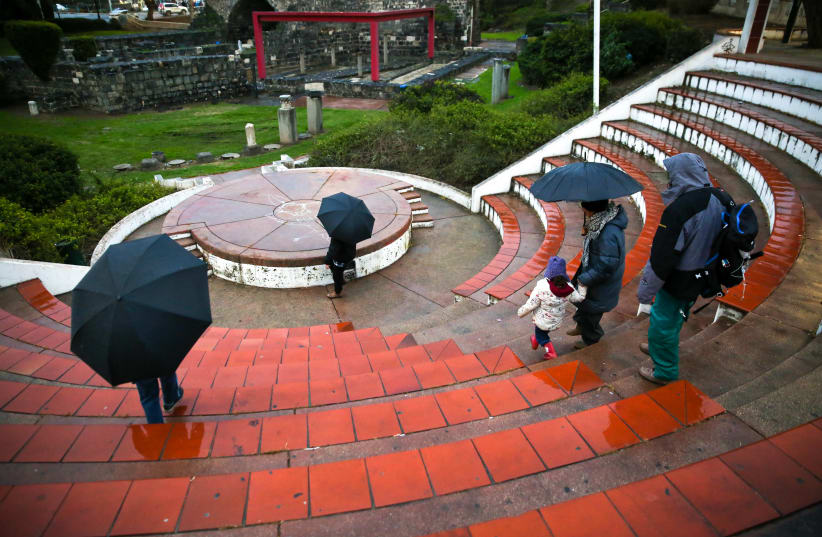The festival of Sukkot reinforces the theme of “sacred time” in Judaism. The God of Israel is one who acts in history. At the encounter of Sinai, God introduces Himself as, “I am the Lord your God who took you out of Egypt!” Meaning, God could have and perhaps should have, introduced Himself, as “I am the Lord your God who created Heaven and Earth!” a far more impressive feat than a national liberation movement.
But God’s choice of leading with the Exodus from Egypt is to teach us that our God is not some aloof being, sitting alone in the cosmos, but One that is close to us and involved in our lives.
Our sacred calendar, as well, expresses this idea.
Unlike the pagan cultures that surrounded it, the Israelite calendar was not based on the general agricultural seasons alone, but on the specific historic occurrences in the life of the people. Passover, the Spring Holiday, marks the date of the Exodus from Egypt, while Shavuot, the Harvest Holiday marks the date of the revelation at Sinai. The Gathering Holiday, Sukkot, recalls the temporary booths that the Israelites lived in during their desert sojourn. But unlike the other holidays it is not connected to any specific date in the life of the nation.
Perhaps the reason for this is that the nature of the observance of Sukkot is different than the other holidays. While all the other mitzvot in the Torah are connected to a specific action or limb, living in the sukkah can only be accomplished with one’s entire body. One needs to enter the sukkah and be fully encompassed by it to fulfill his or her obligation to dwell in the sukkah. There is only one other mitzvah that is accomplished like that, and that is the mitzvah of living in the Land of Israel.
Living in Israel is a mitzvah that requires one’s entire being to be surrounded by, and like the sukkah, submerged by the holiness of the land. I believe it is the Vilna Gaon who points out one other interesting connection between these two mitzvot. Both of these mitzvot needed to be merited in order to observe them. If it is raining, one does not fulfill the mitzvah of dwelling in the sukkah and if one is forced into exile from the land, they too cannot fulfill the mitzvah of living in it.
It would seem though that the second idea of the Vilna Gaon no longer applies. For more than 70 years now, the gates of Eretz Yisrael have been wide open for each and every Jew to come and make their life here. But perhaps things are not that simple.
“A Jew doesn’t die from difficulties!” or so the saying goes. It is used to remind us that the difficult questions we have as Jews can remain as difficulties, and they’re not meant to impede our observance of the commandments. One difficulty that has always plagued me even as a kid was the question of aliyah. How is it possible that I was able to see so clearly that there is no place for a Jew outside of Israel while other Jews, who were by every measure “better Jews” than me, did not see it? How can Jews who have never missed a minyan in their lives, devote themselves to learning Torah and doing good deeds, not see what was so simple and plain to me? How was their observance of the minutia of Halacha so obvious to them while having such a blind spot about the huge all-encompassing mitzvah of living in Israel?
The best explanation I have heard about this is from the original command to make aliyah given to our forefather Abraham. Abram, as he was known then, was told by God to go for himself to a land that “I will show you.” The rabbis explain that you have to be shown Eretz Yisrael by God to really see it, and this is why some Jews, who are otherwise such good Jews, don’t see aliyah as an option. They simply haven’t been shown it by God.
Now we can understand the Vilna Gaon better. Both the mitzvah of sukkah and the mitzvah of living in the Land of Israel need to be merited. God needs to withhold the rain to allow you to enter the sukkah and show you Eretz Yisrael for you to see how aliyah is the obvious option.
This connection is perhaps best understood when you realize that the real special connection between Sukkot and Eretz Yisrael is that there is no holiday that seems to be more meant to be celebrated in Israel than Sukkot. Growing up in New York, rain on Sukkot was a common occurrence. And if it didn’t rain ,we sat with winter coats in the sukkah.
But the climate of the Land of Israel is just right for Sukkot. And only then if it does rain, does the message of the rain that the Vilna Gaon speaks about make sense.
The writer holds a doctorate in Jewish philosophy and teaches in post-high-school yeshivot and midrashot in Jerusalem.
